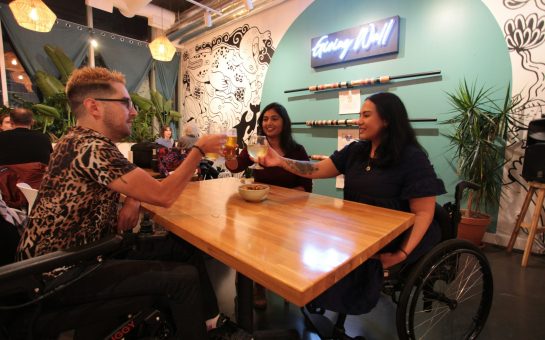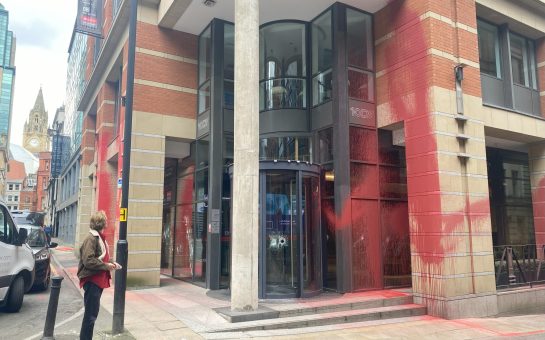Greater Manchester Mayor Andy Burnham was joined today by civic, health, and business leaders to speak about what measures will be taken to mitigate the impact of the escalating coronavirus pandemic on the city area’s health and the economy.
Burnham was keen to emphasise that Manchester policy would not diverge from national guidelines – on a day when it was later announced schools in England, Wales and Scotland would remain closed from Friday onwards until further notice.
“It is not in any way to conflict with the advice that is being made available at a national level, in fact it is to amplify that advice,” he said.
Sir Richard Leese has been handed control of the health portfolio. It is hoped that his wealth of experience in local government will enable him to navigate the inevitable pitfalls of this developing crisis.
With 54 confirmed cases in Greater Manchester, Mayor Burnham warned that there was a high likelihood that the council would struggle to cope with the scale of the crisis.
“We’re looking to mobilise volunteers,” he said, to work alongside Manchester fire services to make “safe and well” checks via phone, and provide other essential services.
Panel members had been heartened to see how quickly and selflessly the people of Greater Manchester had rushed to the aid of vulnerable members of the community, but stressed that such measures ought to be centralised, and overseen by the local council to ensure standards of care and advice were kept as high and up to date as possible.
The council’s most pressing task is to ensure the survival of local businesses that depend upon continuous cash flow for survival, which Burnham stressed ought to be the government’s top priority.
“Much more needs to be done on the cash flow of those [small] organisations and councils,” he said.
Mayor Andy Burnham addressed the press today to outline what measures would be taken to flatten the Covid-19 curve and ensure that Manchester continues to ensure the safety of its citizens. pic.twitter.com/thQbhjwxqM
— Billy (@billbrooks96) March 18, 2020
Certain businesses will inevitably suffer during the current period of social distancing, and measures must be taken to ensure that businesses and their employees can cope financially.
Despite this, panel members all emphasised that anyone continuing to visit their favourite bars and restaurants should cease to do so in order to try and limit contact with other people.
Burnham supported the implementation of school closures starting from next week.
He argued English schools should continue to run a skeleton service for students living with at-risk grandparents, whose parents are employed in crucial services such as law enforcement or healthcare, or whose only reliable access to food is their school meal.
The mayor also made assurances that the city’s homeless population would be protected from the virus, though policy is yet to be decided upon formally.
Although policy is not yet concrete, the mayor teased a tram policy which would cut the frequency of trams in half, but double the length of individual services, thus allowing people to spread out along the tram and avoid physical contact with one another.
Councillor Brenda Warrington emphasised how crucial local services are, and that chronic underfunding since 2010 has crippled them to the extent that they are not well prepared for an emergency like this one.
She called on the government to expand testing and to provide personal protection equipment (masks, gloves, aprons, hand sanitiser) to social care workers, police officers, and other local servicepeople.
She said that she was looking into setting up physical hubs in every district where residents can go for the latest information and official advice.
Professor Kate Ardern was present to discuss the health of Greater Manchester residents, and had plenty of good advice.
She outlined the symptoms that will present in those with the disease, namely, a persistent new cough, and a high temperature – over 37.8 degrees.
If you live alone and begin to present with symptoms, you ought to self-isolate and avoid contact with others for seven days from the day the symptoms appeared.
If you live with family, from the day any one of your family members presents symptoms, all family members should isolate for 14 days from the day the symptoms appeared.
If your symptoms are mild, it is important to stay away from pharmacies, hospitals, and GP clinics, as these are good places to find people who are most at risk.
You should only seek medical attention if your symptoms are extreme.
She reminded us of “a good message from 2009: catch it, bin it, kill it.”
If you have a cough, cough into a tissue, dispose of it properly, then wash your hands. If you cannot do this, avoid coughing into your hand at all costs. Try to cough into the crook of your elbow.
Resources are available online for those seeking official guidelines for businesses, people hoping to volunteer and do their part to help locally, and the latest official medical advice.
For further information visit:
Businessgrowthhub.com/coronavirus



